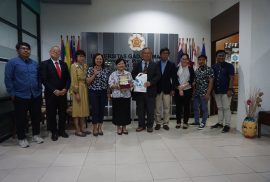SEA Talk #26 “Indonesia-Austria Bilateral Relation” with Simon Gorski (University of Vienna) at CESASS UGM Library (18/09/19). Thank you for your participation and see you at our next event!
Activity
SEA Talk #25 “Futures Studies and Social Sciences: The Future We Want” with Prof. Dr. Jian-bang Deng, a Professor of Sociology at the Graduate Institute of Futures Studies (GIFS) of Tamkang University at CESASS UGM Library (02/07/19).Thank you for your participation and see you at our next event!
Last Friday (21/06/19), Center for Southeast Asian Social Studies, UGM organized the Discussion Series on (ASEAN) Identities II with the speakers: Dr. Wening Udasmoro (Faculty of Cultural Sciences, UGM) and Dr. Budiawan (Graduate School, UGM).
The Southeast Asian Languages Program (SEA Gate) program opening ceremony (13/06/19) was attended by Dr. Hamam Supriyadi, M.A., Asst. Prof. Dr. Pravit Khaemasunun, Asst. Prof. Dr. Ratchaneekorn Sae-Wang, Dr. Pongthep Vorakitpokatorn, and Dr. Veluree Metaveevinij from Thammasat University and Dr.phil. Hermin Indah Wahyuni, Drs. Muhadi Sugiono, M.A., and Dr.phil. Vissia Ita Yulianto from Universitas Gadjah Mada. This semester, there are 23 SEA Gate participants from College of Innovation, Thammasat University and Faculty of Liberal Arts, Thammasat University .
SEA Chat #17 “Southeast Asia in the Age of Outer Space Exploration” with Inas Mufidatul, an undergraduate student of International Relations, Universitas Gadjah Mada, at CESASS UGM Library (27/05/19).
SEA Chat #16 “Thailand: Far from Democracy. A Comparative Analysis between Thailand and Indonesia” with Aniello Iannone, an undergraduate student of Southeast Asian Studies, University of Naples L’Orientale, Italy, at CESASS UGM Library (23/05/19). Thank you for your participation and see you at our next event!
Discussion Series I “ASEAN Community: Does Identity Matter?” with Drs. Muhadi Sugiono, M.A., a researcher at CESASS UGM and a lecturer at Department of International Relations UGM, at CESASS UGM (23/05/19).
Training of Journal Management and Communication Strategy Preparation for PUI PT with Syahrul Fauzi, S.Pt., M.Pd. (Publishing and Publication Agency – BPP UGM), Wuri Handayani, MA PhD. (Journal of Economy and Business UGM), Ika Krismantari (The Conversation), and Drs. Eduard Depari, MA., M.Sc. (Indonesian Television Academy) invites the Indonesian Center for Science and Technology (PUI-PT) Featured Center and Research and Technology at Tara Hotel Yogyakarta (05/17/19).
SEA Chat #15: Panel Discussion “Empowering Refugees in Southeast Asia” with Rahma Safira S. (Faculty of Law, Universitas Gadjah Mada) and “Negotiations between Youth and Job Market Flexibility: A Case Study of Micro-Celebrities in Yogyakarta” with Arif Budi D. (Dept. of Sociology, Universitas Gadjah Mada), at CESASS UGM Library (16/05/19).
SEA Chat #14 “Extrajudicial Killings of “War on Drugs” in the Philippines” with Laras Ningrum, an undergraduate student of Universitas Muhammadiyah Yogyakarta, at CESASS UGM Library (09/05/19). Thank you for your participation and see you at our next event!










